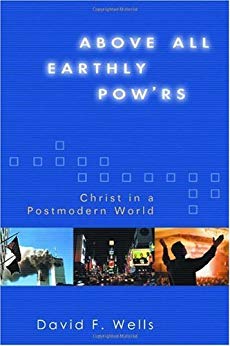A Brief Book Summary from Books At a Glance
By Benjamin Montoya
About the Author
David F. Wells (PhD, University of Manchester) is the Andrew Mutch Distinguished Professor of Historical and Systematic Theology at Gordon-Conwell Theological Seminary.
Introduction
Before the events that took place on 9/11, America had little use and meaning for a word like “evil.” It was entirely dependent on one’s own perspective in a postmodern culture. But, after this event, things changed. People began to use this word. The difficulty of using a word like this one is that it does not come from a postmodern worldview. It comes from a biblical worldview. In the Bible, Christ is “above all earthly pow’rs,” as the famous hymn states. But, how do we reconcile Christ with this world—the events that take place and the perspectives of this world? In this book, Wells considers Christ in a postmodern world as a conclusion to his series that began with No Place for Truth.
Table of Contents
Introduction
Chapter I Miracles of Modern Splendor
Chapter II Postmodern Rebellion
Chapter III Migrations, the Banquet of Religion, and Pastiche Spirituality
Chapter IV Christ in a Spiritual World
Chapter V Christ in a Meaningless World
Chapter VI Christ in a Decentered World
Chapter VII Megachurches, Paradigm Shifts, and the New Spiritual Quest
Chapter VIII The Day of New Beginnings
Chapter I: Miracles of Modern Splendor
In our day, people often give little thought to the nature of the world. Our time is often filled with the things that this world imposes upon us—work, family, fun, etc. Why is that? Part of the reason is due to industrialization. We now live in a kind of world that is filled with all sorts of technological advances previously unknown to humanity. How did the world become like this? If we intend to live as authentic Christians in this time, we need to come to understand the so-called “miracles of modern splendor” for what they really are.
As it turns out, the miracles of modern splendor appear to be satisfying—delicious, even—but they are dangerous because of where they come from. Much of what we know today comes from the Enlightenment. “What the Enlightenment ideology did was to provide an interpretive give, an all-encompassing understanding, that was laid over the whole of life.” The centerpiece of the Enlightenment can be summed up in one word: freedom. At first glance, “freedom” doesn’t sound so bad. But, when we consider from what the Enlightenment sought freedom, this ideology becomes all-the-more concerning. The Enlightenment sought freedom in at least three areas.
First, the Enlightenment sought freedom from the past. Second, the Enlightenment wanted freedom from God. Third, the Enlightenment desired freedom from authority. Why did the Enlightenment seek freedom in each of these areas? “At its heart were the demand for freedom from all external authority and the belief that it was reason which carried in itself the means of unlocking the riddles of life and paving the way to progress, of finding for itself meaning in life and finding a way out of human darkness.” The unfortunate reality for Christians is that they should expect the world to behave in such ways.
Paul explained that the world acts like this in several places, perhaps most notably in Ephesians 2:1–3. Paul speaks of people who “follow the course of this world.” As Christians, we cannot follow the course of this world. Part of the problem with this entire larger discussion is that some of the cultural values have, in fact, affected Christians. The modern age has brought with it a consumeristic mindset that has infiltrated how Christians chose a church, often based on the programs it offers. The church becomes more about an “experience” than theology because the culture has seen the same shift. To avoid speaking of God, our culture has replaced Him with entertainment and a bloated sense of the abilities of humanity.
That said, some of the ideas that came with the Enlightenment have been rejected by what has become known as postmodernity. It has rebelled from the idea of progress humanity once had. The next chapter will turn to consider this rebellion more fully.
Chapter II: Postmodern Rebellion
The ironic part of the rebellion from the Enlightenment/modernism by postmoderns is that the two are still related. “They are more like siblings in the same family than rival gangs in the same neighborhood.” They are reflecting on the same issues from different directions that has birthed what can be called a postmodern rebellion.
The postmodern rebellion has come in several areas. First, postmoderns have withered away the soul of the Enlightenment. Recall that the Enlightenment had a very positive outlook on the future of mankind to make progress given its newfound freedom the things mentioned in the previous chapter. How does postmodernism respond? They strike…
[To continue reading this summary, please see below....]The remainder of this article is premium content. Become a member to continue reading.
Already have an account? Sign In
